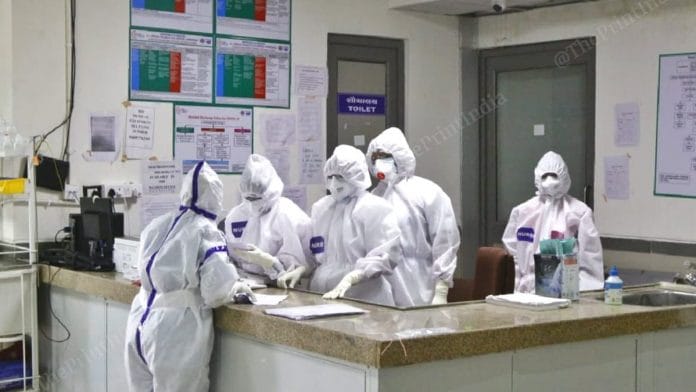New Delhi: Scientists at the Institute of Genomics and Integrative Biology (IGIB), under the Council of Scientific and Industrial Research (CSIR), have documented two cases of Covid-19 reinfections for the first time in India.
In a preprint paper, which is yet to be peer-reviewed, the researchers shared details of two health care workers, who were working in a hospital’s Covid-19 ward, and were infected by the SARS-CoV-2 virus twice over a span of three months.
Both patients were asymptomatic the second time, and the reinfection was detected during routine surveillance.
“Our analysis demonstrates that asymptomatic reinfection could potentially be an under-reported entity with implications in long term surveillance of SARS-CoV-2 infections,” the team wrote in the study.
The findings also highlight the importance of continuously monitoring healthcare workers who are not only at risk of primary infections, but may also get reinfected.
There have been multiple reports of Covid-19 reinfections in India. Telangana reported two cases of Covid-19 reinfection among medical professionals in August, with a gap of around two months between the bouts.
Similarly, a 50-year-old Delhi policeman contracted the disease a second time in July, just one-and-a-half months after recovering from it.
However, the IGIB study is the first to confirm reinfections using genome sequencing.
Also read: Saving lives or driving the dead, Covid ambulance drivers slog it out without rest or raise
The study
The study describes two healthcare workers, a 25-year-old male and 28-year-old female, who were posted in the Covid-19 unit of a tertiary hospital in India.
The two had first tested positive for SARS-CoV-2 through RT-PCR tests on 5 May and 17 May, respectively. Even though both individuals were asymptomatic, they were hospitalised according to institutional policy.
Subsequently, they tested negative on 13 May and 27 May, respectively, and resumed their duties in the Covid ward.
The male healthcare worker tested positive again for SARS-CoV-2 on 21 August and recovered in 14 days, while the female healthcare worker tested positive on 5 September. Six days after the reinfection, she also recovered from the virus.
RT-PCR tests cannot distinguish between live virus and viral debris. Therefore, to confirm that these cases were indeed reinfections and that the test did not just detect leftover viral debris from the previous infection, the team conducted genetic sequencing of the virus samples from both patients.
They found that in both cases the viral strain was genetically distinct from the first infection, confirming that these were indeed cases of reinfections.
However, experts believe that the study does not provide much insight into reinfections.
“Individual cases like these, while useful as data, do not really provide much explanatory insight. That is especially so in this instance because there is no characterisation of anti-SARS-CoV-2 antibody responses in these individuals in the report, so there is no way to make any comment at all about the presence or absence of protective immunity,” said Satyajit Rath, an immunologist at Indian Institute of Science Education and Research, Pune.
“The majority of cases of SARS-CoV-2 infection, especially among young adults, are asymptomatic, so the fact that all four infection events in these two individuals were asymptomatic does not really tell us anything useful, either,” he added.
In the study, the researchers noted that even though both individuals were asymptomatic, they had a higher viral load the second time. According to Rath, this difference also makes the report “hard to interpret”.
Also read: Sticky ‘nets’ of DNA cause tissue damage in severe Covid-19 infections, study finds
Govt admits reinfections are happening, though ‘rare’
During a press briefing Tuesday, the government admitted that reinfections were happening but reiterated that they were “very, very rare”.
This was the first time that the government had acknowledged that reinfections were taking place. A few weeks ago, Health Secretary Rajesh Bhushan had dismissed “hypothetical” questions about a health ministry staffer getting reinfected with Covid-19.
The Director-General of the Indian Council of Medical Research (ICMR) Dr Balram Bhargava, however, said that this was “not a matter of serious concern.”
“Whenever reinfection has happened, both infections have been mild,” Bhargava said in the briefing.
Research studies have shown that the level of Covid-19 antibodies decline after two-three months of recovery.
However, immunologists pointed out that antibodies are not the only thing protecting our bodies from reinfections.
Another part of the immune response is mediated by T cells (a type of the white blood cells) that also protects the body against reinfections. As a result, the possibility of reinfections continues to be very little.
However, the IGIB study has now confirmed that while rare, reinfections are indeed possible.
More importantly, those who are constantly exposed to the virus — such as health care workers — may continue to be at risk, even after recovering from Covid-19.
Also read: Delhi Rt value on rise though tests up 3 times, experts say people ‘lax’ in taking precautions






